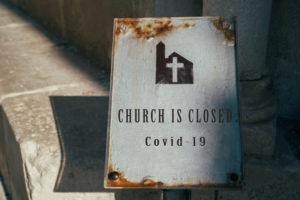
The church in the words of C.S. Lewis, “…exists for nothing else but to draw men into Christ, to make them little Christs. If they are not doing that, all the cathedrals, clergy, missions, sermons, even the Bible itself, are simply a waste of time.”
There is absolutely no doubt that the Church in our post-pandemic world has changed. Just ask any Christian how their faith has been impacted since the “pandemic” and you are likely to get an ear full. If you ask your local pastor the same question, they are apt to take you down a path of biblical Scripture, growing your faith, and then talk about worship format (technology), attendance and challenges about getting people engaged and returning to a physical church location. I find myself frequently looking at the online congregation and saying “One Christian is no Christian. God created us to be together in fellowship. It’s time to get back to church. Come on, we have free donuts!”
To be impactful in this new chapter of ministry, churches must learn to navigate cultural changes, rethink and innovate. Good news, God sent us the perfect teacher for these challenging times, Jesus Christ. We are now three years since COVID-19 became common vernacular. We are still discerning the impact of the pandemic on our bodies and the health of the church in the short and long term. An Axios poll found that sixty-two percent of Americans believe the pandemic is over — many weeks after that, the World Health Organization announced that COVID-19 is no longer a “public health emergency of international concern.” Now we continue our search for best practices and hopefully can scale the imaginative worship methods that were successful during the pandemic.
Pandemic or blessing?
 “And we know that for those who love God all things work together for good, for those who are called according to his purpose” (Romans 8:28).
“And we know that for those who love God all things work together for good, for those who are called according to his purpose” (Romans 8:28).
Once the seriousness of Covid-19 hit, we all had to leave our comfort zones. I remember walking down Ft. Lauderdale beach during the height of spring break and seeing helicopters trying to get the college students to socially distance (good luck!). Finally, the beaches were closed, and the impact became real. Churches were told to stop gathering in person and find unique ways to worship. We were all forced to rethink and move out of our predictable, comfortable worship zones and innovate.
Was this a blessing in disguise? It is a good thing that God blessed us with the most radical, revolutionary, out of the box evangelist of all time, Jesus Christ. As C.S. Lewis mentions in Mere Christianity, we were obligated to become “little Christs.”
The church suddenly was forced to isolate and embrace creative methods to deliver the message of Jesus’ hope and love. Some of us hosted drive-up communion, drive through nativity scenes, and even held social distant worship services on the beach, using battery powered karaoke machines. Committed church members made meals and left Bibles and packages of food on doorsteps. New groups sprung up that offered video conferencing venues. People that were called to reflect on their mortality and reach out to the church finally had a comfortable, online venue that enabled them to connect with a church. Many churches were forced to invest heavily in technology and started offering two live-streaming services per week. Our church even augmented our “waterfront worship” and started kayak devotions. New faces began to appear. The traditional barriers of brick-and-mortar worship services were reduced, which brought people back to church after many years. We heard comments like “I’m not intimidated to go to church in this setting.” Believers and non-believers alike were reassessing their walk with Christ.
As we fully transition into a post-pandemic era, what if the Church continued to engage our communities this way? This would indeed be implementing the missional teaching of Jesus Christ by leveraging twenty-first century technology and a Christ centered, Kingdom focused mindset. Churches would be transformed if they continue to focus on how they changed in order to fulfill the great commission and make disciples.
Post-Covid revival
“Go therefore and make disciples of all nations, baptizing them in the name of the Father and of the Son and of the Holy Spirit, teaching them to observe all that I have commanded you. And behold, I am with you always, to the end of the age” Matthew 28:19-20.
We are now called to make disciples in the post Covid-19 Church. This is exciting! Our mission is the same and has been updated. As believers, we are called to engage the Body of Christ to connect with a culture never more in need of the Gospel and of the hands and feet of Jesus in action. A physical location for our communities to meet is an excellent tool needed to continue to grow the church and our relationships with God and each other, but it is not always the best means to reach our communities. If we are to impact the trends of those leaving the Church, those who have not stepped through its doors, and those who are finally reaching out to Christ, we must move beyond the walls of the Church. Jesus was a revolutionary and an innovative evangelist. Our post-Covid-19 world requires this approach too. It’s time for revival and it is happening across the country. Let’s continue together, in our own families of faith and in our local communities. Let’s move ahead through creative, out of the box ministering and find fresh expressions and means to be “sent” as Jesus has called us to be.
 The Rev. Dr. Mark George Van Dorn is Chaplain of The International Swimming Hall of Fame and Founding Pastor of Florida Faith Church. Visit floridafaithchurch.com
The Rev. Dr. Mark George Van Dorn is Chaplain of The International Swimming Hall of Fame and Founding Pastor of Florida Faith Church. Visit floridafaithchurch.com
For more on keeping the faith, visit https://www.goodnewsfl.org/topic/god/active-faith/

Comments